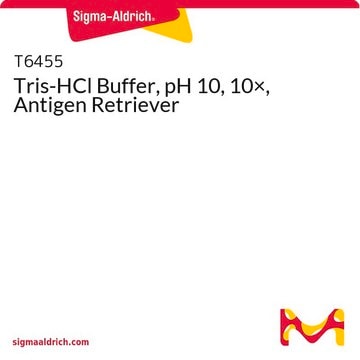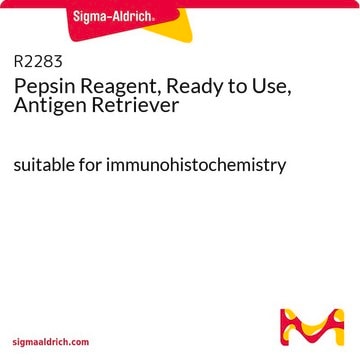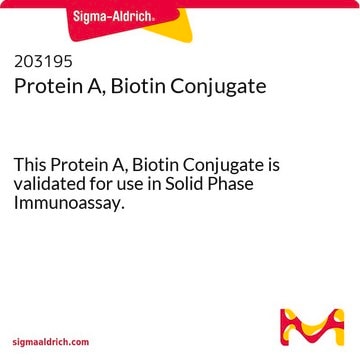E1161
EDTA Buffer, pH 8.5, 10×, Antigen Retriever
Anmeldenzur Ansicht organisationsspezifischer und vertraglich vereinbarter Preise
Alle Fotos(1)
About This Item
UNSPSC-Code:
12352107
NACRES:
NA.47
Empfohlene Produkte
Anwendung
Used as a heat-induced antigen retriever on formalin-fixed paraffin-embedded (FFPE) tissue sections prior to application of antibodies. In immunohistochemistry (IHC), most commonly used fixatives such as formalin mask tissue antigens (cellular, membrane, and nuclear) by their intrinsic crosslinking. This masking results in poor or no staining in IHC. The use of EDTA buffer, pH 8.5, or other antigen retrieval solutions on FFPE tissue sections improves accessibility of antibodies to tissue antigens. EDTA buffer has been used to heat tissue sections in order to visualize antigens by immunohistochemical analysis.
Signalwort
Warning
H-Sätze
Gefahreneinstufungen
Aquatic Chronic 3 - Skin Sens. 1
Lagerklassenschlüssel
12 - Non Combustible Liquids
WGK
WGK 3
Flammpunkt (°F)
Not applicable
Flammpunkt (°C)
Not applicable
Analysenzertifikate (COA)
Suchen Sie nach Analysenzertifikate (COA), indem Sie die Lot-/Chargennummer des Produkts eingeben. Lot- und Chargennummern sind auf dem Produktetikett hinter den Wörtern ‘Lot’ oder ‘Batch’ (Lot oder Charge) zu finden.
Besitzen Sie dieses Produkt bereits?
In der Dokumentenbibliothek finden Sie die Dokumentation zu den Produkten, die Sie kürzlich erworben haben.
Kunden haben sich ebenfalls angesehen
Expressions of matrix metalloproteinases 2, 7, and 9 in carcinogenesis of pancreatic ductal adenocarcinoma.
Jakubowska K, et al.
Disease Markers, 2016 (2016)
Thomas J Gniadek et al.
Modern pathology : an official journal of the United States and Canadian Academy of Pathology, Inc, 30(4), 530-538 (2017-01-07)
Predicting response to checkpoint blockade therapy for lung cancer has largely focused on measuring programmed death-ligand 1 (PD-L1) expression on tumor cells. PD-L1 expression is geographically heterogeneous within many tumors, however, and we questioned whether small tissue samples, such as
Hong-Wei Sun et al.
Cancer immunology research, 9(1), 20-33 (2020-11-13)
Metabolism is reprogrammed in cancer to fulfill the demands of malignant cells for cancer initiation and progression. Apart from its effects within cancer cells, little is known about whether and how reprogramed metabolism regulates the surrounding tumor microenvironment (TME). Myeloid-derived
Unser Team von Wissenschaftlern verfügt über Erfahrung in allen Forschungsbereichen einschließlich Life Science, Materialwissenschaften, chemischer Synthese, Chromatographie, Analytik und vielen mehr..
Setzen Sie sich mit dem technischen Dienst in Verbindung.












